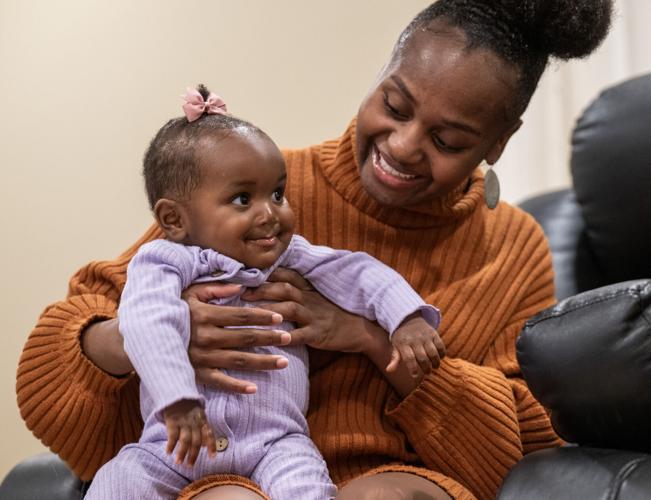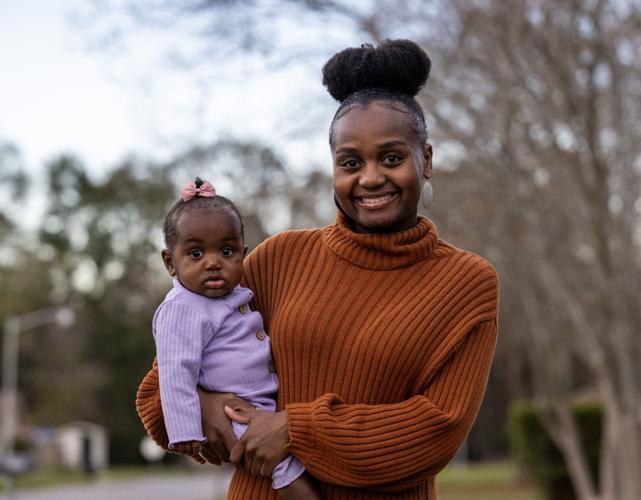Knee replacements come with more instructions than newborns.
Are they eating enough? Sleeping enough? Growing enough? It can be hard for new parents — sleep-deprived and overwhelmed — to know.
And a lack of knowledge about how to take care of an infant can be deadly.
Louisiana has one of the highest rates of infant mortality in the developed world. Many deaths could be prevented with safer sleep practices for infants, and many parents struggle to care for newborns who were born too early or too tiny, two main drivers of infant loss in Louisiana.

Rates vary for home visits from nurses: Studies have shown that home visits from nurses can help reduce infant deaths, but Louisiana’s program does not come close to reaching all families with newborns.
Home visits from nurses for families with newborns have been successful on a small scale in Louisiana and at a more ambitious level in other states and countries. Parents can choose to have a nurse or another specialist check on them at home, and help teach them how to care for their infant.
Louisiana’s current home visiting programs only reach 6% of newborns across the state, according to a new report from the Louisiana Policy Institute for Children. The visits are mostly limited to low-income families on Medicaid, and in some cases, to first-time parents.
Experts say that broadening home visiting could improve infant and maternal outcomes.

“We do a pitiful job of helping women with that transition of care,” said former state health secretary Rebekah Gee, an obstetrician.
The New Orleans Health Department is piloting a universal home visiting program for all Orleans Parish families who give birth at Touro Infirmary or Ochsner Baptist, the city’s two main birthing hospitals. Their program follows a model called Family Connects International, which gives guidelines for how nurses should evaluate families and perform visits. Families can receive home visits regardless of income status.
“Being in the homes — it's so much more intimate than in the hospitals,” said Katherine August-Autry, the clinical manager for Touro’s program. She previously worked for the state’s Nurse-Family Partnership and Parents as Teachers home visiting programs.
“The families feel like they have a little bit more control or autonomy,” she said. “It was the total opposite relationship and comfort level in their homes than it would be at the (hospital) bedside. So that lends to a better relationship as far as them trusting what we're saying, as it relates to their health and care and adhering to what's being taught to them and expected of them once they leave the hospital.”

Taylor Cherry looks at her nine month-old daughter Journee Lollis while outside the Cherry home on Monday, December 4, 2023 in Baton Rouge, Louisiana.
Taylor Cherry, 23, of Baton Rouge, has been receiving home visits since she had her 9-month-old daughter, Journee Lollis. She’s enrolled in another type of home visiting program called Healthy Start through the nonprofit Family Road of Greater Baton Rouge, which has a goal of working with 300 moms and 100 dads to reduce infant mortality.
Cherry, a first-year law student at LSU’s Paul M. Hebert Law Center, said she’s gotten parenting classes, free diapers, baby toys, case management and more. As she juggles late nights studying with raising Journee, the assurance from the program has helped.
“You can’t buy that type of support,” she said. “After you get out of the hospital, you have one family visit postpartum, and that’s it.”
Without postpartum care, blood pressure and safe sleep are neglected
The first weeks after giving birth and bringing home a newborn can be both difficult and dangerous.
National data shows that more than half of pregnancy-related maternal deaths happen postpartum, rather than during birth. And Louisiana has particularly high rates of infants dying past their first 27 days of life, with Sudden Unexplained Infant Death being the most common cause, according to the state.
“The city wanted to fill that gap and wanted to make sure that we're providing the service for all families, regardless of race, regardless of their economic status,” said Meshawn Siddiq, deputy director of the New Orleans Health Department.

Dr. Edward "Ted" Veillon moves an ultrasound across the belly of Lauren Matthews at St. Francis Medical Center. She and Dr. Veillon talked at length about the possibility of her second baby also having the disease.
Gaby George, a Touro nurse who does home visits, devotes a lot of time to teaching moms about preeclampsia, the importance of taking blood-pressure medicine and when blood pressure gets so high that medical care is needed. High blood pressure is common in Louisiana’s population, and it can be deadly both during and immediately after pregnancy.
It’s common for moms to skip postpartum doctor’s appointments while they’re swamped with newborn care, and the state does not require employers to offer any paid maternity leave. Many are forced to return to work to pay the bills, regardless of whether they or their babies are healthy enough to do so.
George also teaches parents about safe sleep practices: infants should be put to sleep on their backs, on a firm, flat surface, without any other objects like pillows and toys. Nurses can also drop off blood-pressure cuffs, diapers and portable cribs for families who otherwise do not have a safe place for their infants to sleep.
George and August-Autry have completed about 40 visits between them since ramping up the program in late October. They spend about two hours with the families they visit. Some families might need extra visits if their newborn isn’t meeting milestones; they can receive up to three.

Advocates and members of Family Road of Greater Baton Rouge set up strollers along the steps of the capitol during a press conference held by Family Road Healthy Start in recognition of Infant Mortality Month on Wednesday, September 27, 2023. There were 54 strollers, all numbered, representing the 54 infants who died in East Baton Rouge before turning one-year old in 2022.
George is also a native Spanish speaker, which helps build rapport with Spanish-speaking clients.
“When I tell them I have a nurse who will see them that speaks Spanish, I can see the expression on their faces change and light up and they're like, ‘Oh my God, thank God,’” August-Autry said.
Touro is still trying to hire three more nurses to fully staff the new service. Ochsner Baptist is in the process of setting up its home visiting program, which officials hope will start early next year.
“We've learned that so much about infant and maternal mortality, it has to do outside of the hospital walls,” said Beth Walker, Ochsner Baptist’s CEO. “This is something where we can continue to effect change that's not in traditional health care spaces, but it means a lot in what the future of health and wellness is.”
How could Louisiana afford universal home visits?
While many home visiting programs have evidence-based practices proving their effectiveness, they can be costly.
The federal government foots the bill for most of Louisiana’s home visiting programs. While the Louisiana Department of Health budgeted $23 million for home visiting in the current fiscal year, barely 10% of that came from the state general fund.

Taylor Cherry holds her nine month-old daughter Journee Lollis outside the Cherry home on Monday, December 4, 2023 in Baton Rouge, Louisiana.
It would cost an additional $25 million per year to expand Louisiana’s home visiting programs to reach every newborn in the state, according to the report from the Louisiana Policy Institute for Children. The additional money would require increasing the LDH’s budget by just 0.13%.
Caring for a newborn is difficult regardless of someone’s income or education status. Gee said she was petrified after having her first baby.
“Just because you’re educated or whatever, you don’t know anything about swaddling a baby,” Gee said. “I was depressed and nobody asked me, they assumed, ‘Oh, you’re a doctor.’”
The state doesn’t necessarily have to incur all the costs of a universal program.
Oregon, for example, passed legislation in 2019 to mandate the availability of universal home visiting for families with newborns. Lawmakers there have since voted to require health insurance plans to reimburse the cost of that program, with reimbursement rates of $1,192 per case, according to the Louisiana Policy Institute for Children’s report.

In New Orleans, the city has budgeted $1.5 million for its Family Connects pilot program. Most of that money is for contracts and staffing with Touro and Ochsner Baptist. Each hospital should have five team members.
Medicaid can also reimburse for home visits. Gee created a startup called Nest Health that does home visits for patients on Medicaid, including families with newborns. It is reimbursed through Medicaid using “value-based care,” meaning Nest’s payments are tied to patient outcomes. If a patient uses the emergency room less because they’re getting in-home primary care, Nest gets paid more.
“While we’re there seeing the new baby, we’re also seeing mom,” Gee said. “Let’s say she is severely depressed or she’s got an infection from her C-section, or she’s got really high blood pressure because she had preeclampsia … We’re able to check mom seven times in that first year when we’re also checking the baby.”
The federal government also gives grants for programs that include home visiting but are not deemed “home visiting programs.” Those include the Healthy Start program that Cherry is part of; it is classified as a grant program that’s meant to prevent infant mortality, rather than a home-visiting program.
How other states, countries have created a road map
Home visits for families with newborns are the norm in the U.K. and several other European countries with far better outcomes for infants and mothers than in the U.S. Some states are trying to emulate them.

Jasmine Sims, 26, holds her infant, Israel, who was born at 23 weeks at St. Francis Medical Center.
Along with Oregon, New Jersey passed legislation in 2021 to mandate voluntary, universal newborn home visits within a baby’s first two weeks of life. Both Oregon and New Jersey are in the process of phasing in their programs; Oregon has rolled its out within four communities, while New Jersey was soliciting bids for its program, which is estimated to cost $45 million, according to the Louisiana Policy Institute for Children report.
Tulsa, Oklahoma has also offered home visits through Family Connects since 2017 at a hospital with a high concentration of Medicaid births. The program has had a robust response, with 90% of mothers opting to participate, according to the report.
Siddiq said she hopes the New Orleans example will prompt calls for universal home visiting across Louisiana.
“So many of our other parishes, our lawmakers are looking forward to seeing the results of the programs so that they can advocate for coverage for everyone,” she said.













